
In an era of right-wing ascendancy and endless wars, Dennis J. Kucinich has stood out as one of the few respectable figures in American politics.
During his 16 years in Congress between 1997 and 2013, Kucinich (D-OH) was consistently anti-war—opposing even wars like Kosovo, Serbia, Syria and Libya orchestrated by Democrats that most of his Democratic Party colleagues supported.
Kucinich additionally tried to reign in the CIA, and supported a bill to replace the Federal Reserve with a monetary authority within the U.S. Department of the Treasury that would undercut the power of private banks and allow direct government financing of infrastructure projects.
Unfortunately, Kucinich was defeated in his bid to return to the U.S. Congress in Ohio on November 5.
Running as an independent, Kucinich’s campaign platform was to end America’s endless wars, protect constitutional rights to free speech and cut the deficit, which he has said is the result of “financing foreign adventures and getting dragged into more wars.”
In an exclusive interview on November 7, Kucinich told me that he was encouraged that he “got 50,000 votes in a highly polarized political environment, which was more than any independent candidate in the country in a three-way race.”
Kucinich said that a lot of voters told him that they appreciated everything he had done for the people of Ohio throughout his career but that they were voting on a straight party ticket.
Kucinich believes that the national election result represented a “rejection of the globalist agenda and policy of endless war that has been embraced most fervently by the Democratic Party.”
“People want things taken care of at home,” he said. “58 percent of discretionary income is being spent on the military and you can’t separate the domestic economic problems from the waging of endless wars. Over $8 trillion of the [$35 trillion] deficit is linked to wars and globalist policies have helped precipitate the crisis at the border and illegal immigration.”
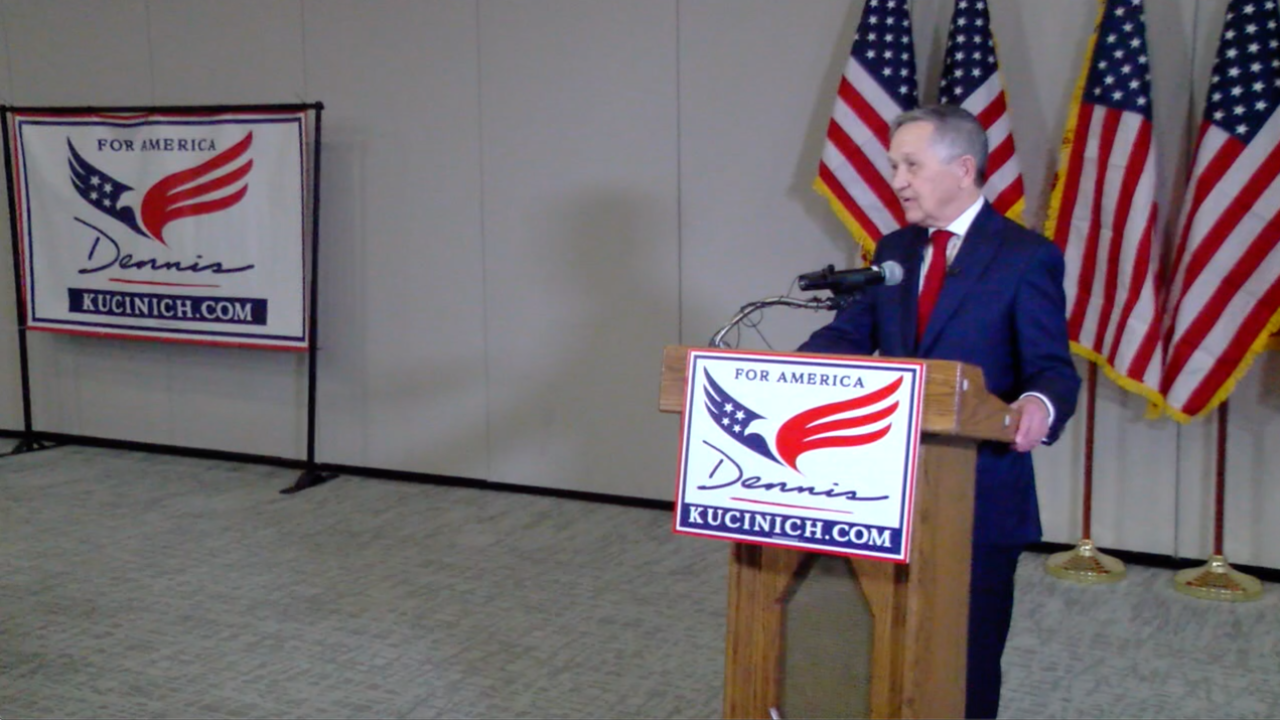
Kucinich is among those dismayed at how the State Department has evolved into “an extension of the Pentagon which no longer engages in diplomacy” and believes that many people supported Donald Trump because they “believe he will follow through on his rhetoric about extracting the U.S. from global conflicts and [about] avoiding wider wars.”
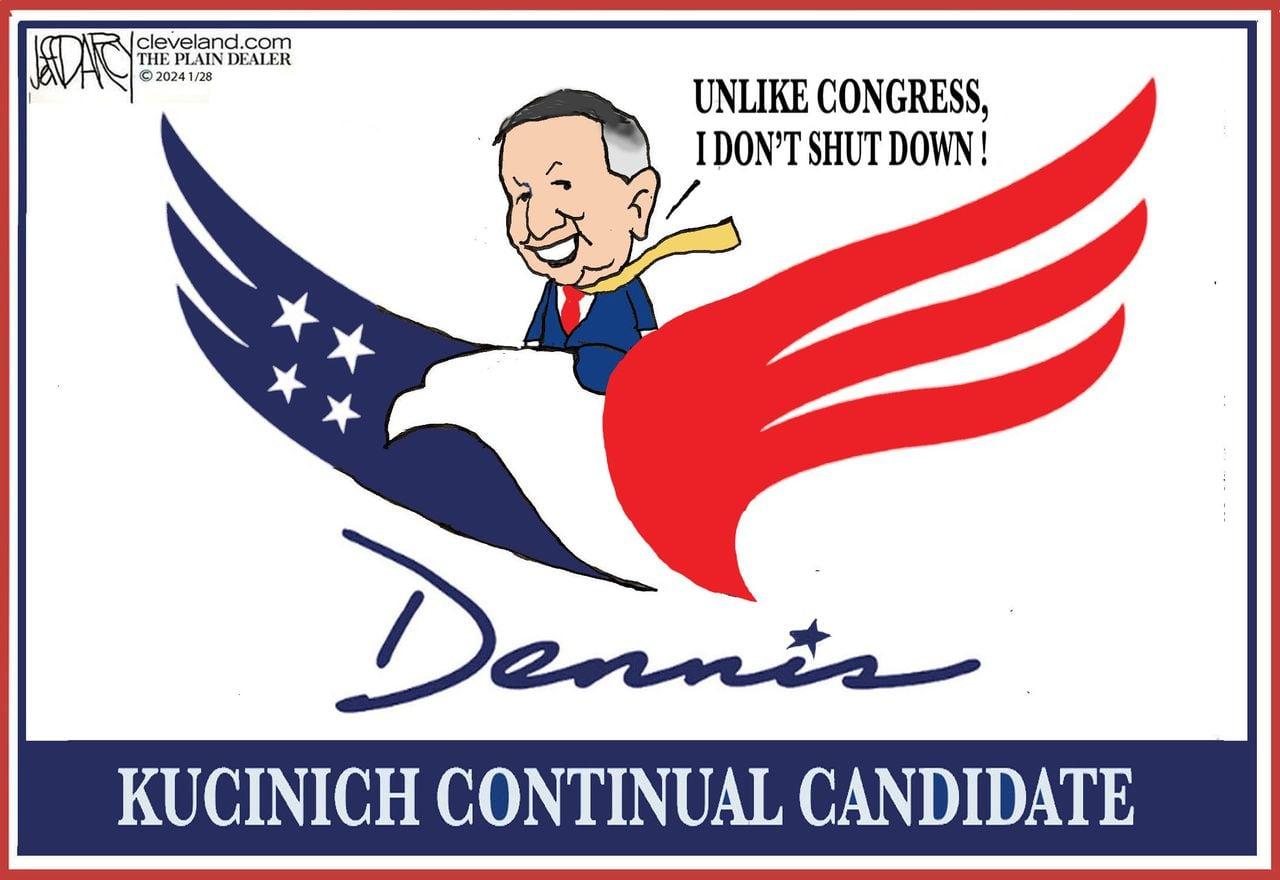
According to Kucinich one of Trump’s biggest challenges will be to “sustain the U.S. economy amidst the rise of BRICS” and “potential loss of elasticity of the U.S. dollar resulting from the BRICS states’ development of alternative economic arrangement and desire to undercut the primacy of the U.S. dollar as a medium of global exchange.”
The BRICS conference at Kazan, Kucinich says, was significant in “setting the groundwork for an alternative global economic structure.” The pressure being put on the U.S. dollar now is resulting from a “backlash against U.S. foreign policy, including failure of U.S. sanctions policies, which helped the Russian economy but damaged the American one.”
Kucinich stated that his break from the Democrats occurred because he “couldn’t be part of a party that he was in fundamental disagreement with,” especially over its “constant promotion of war which it needs to get away from.”
Kucinich recalled clashing directly with Barack Obama in 2011 over his bombing of Libya, noting that Obama “was not happy with me for challenging him over that.” At the end of his presidency, however, “Obama admitted that Libya was his greatest mistake and claimed that Hillary Clinton pushed him into it.”
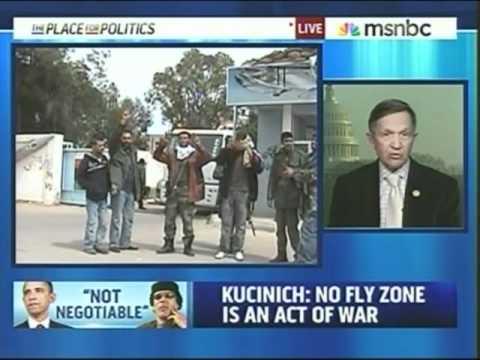
After Kucinich challenged Obama on Libya, he says that his congressional phone was tapped illegally. He learned about this when reading a story in The Washington Times recounting what was supposed to be a secret conversation that he had with some of Libya’s top leaders.
This is just “one example of the intelligence agencies’ having gone amuck,” he said, and “there are plenty of others.”[1]
It is worth noting that Donald Trump’s previous tenure as President of the United States was markedly hawkish in many areas of his foreign policy. Trump allowed neocon forces led by John Bolton to kill any peace negotiations with North Korea, expanded the sanctions regimes on Iran, Venezuela, and Cuba, and pledged his support to Israel by moving the U.S. embassy to Jerusalem.
Fighting the Good Fight in Cleveland
Kucinich has been battling against entrenched special interests for more than 55 years, having spearheaded a petition drive to block privatization of Cleveland’s utilities after his election to the Cleveland city council as a 23-year-old in 1969.
After a failed run for Congress in which he advocated for ending the Vietnam War, Kucinich was elected mayor of Cleveland in 1977 at age 31 based on his promise to save public power.

The ensuing epic campaign pitting Kucinich against Cleveland’s entrenched financial powers is chronicled in his 2021 book The Division of Light and Power.
Kucinich opens his book with a quote from Tom Johnson, Cleveland’s mayor from 1901 to 1909 who founded Muny Light electric company and was an admirer of progressive thinker Henry George, who said he believed in “public ownership of all public service monopolies for the same reason as I believe in the municipal ownership of waterworks, of parks, of schools, which is because if you do not own them [corporate monopolies], they will in time own you. They will corrupt your politics, rule your institutions and finally destroy your liberties.”[2]
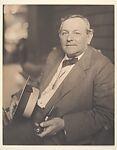
Kucinich’s affinity for the underdog was rooted in his experience as an undersized high school quarterback where he “prepared for a career in Cleveland politics with every blinding tackle, sack, forearm in the face, bell-ringer and dirt-eating episode known as ‘the game.’”[3]
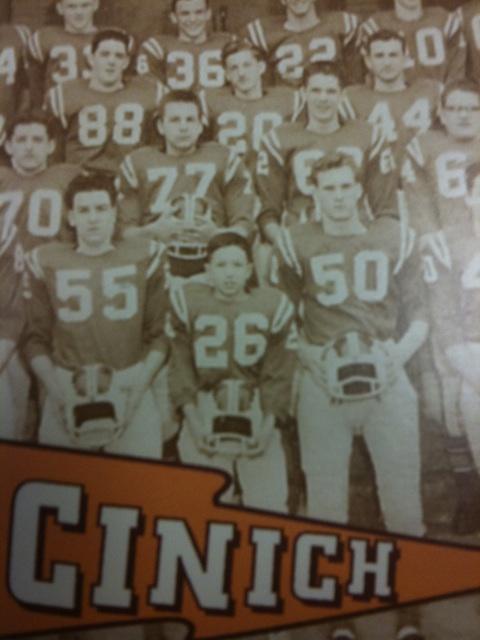
Refusing to accept favors from special interests whose money incapacitated many of his colleagues, Kucinich says that he campaigned door-to-door relentlessly and built a big personal following as a healthy substitute for corporate contributions.[4]
Kucinich was mentored by a local attorney named Milt Schulman who provided him with documents on land frauds, corrupt federal programs and capital improvement boondoggles and explained to him how bond financing was a “racket for law firms, investment bankers and Wall Street”—the people he said who “run the financial system” and were “a bunch of crooks.”[5]
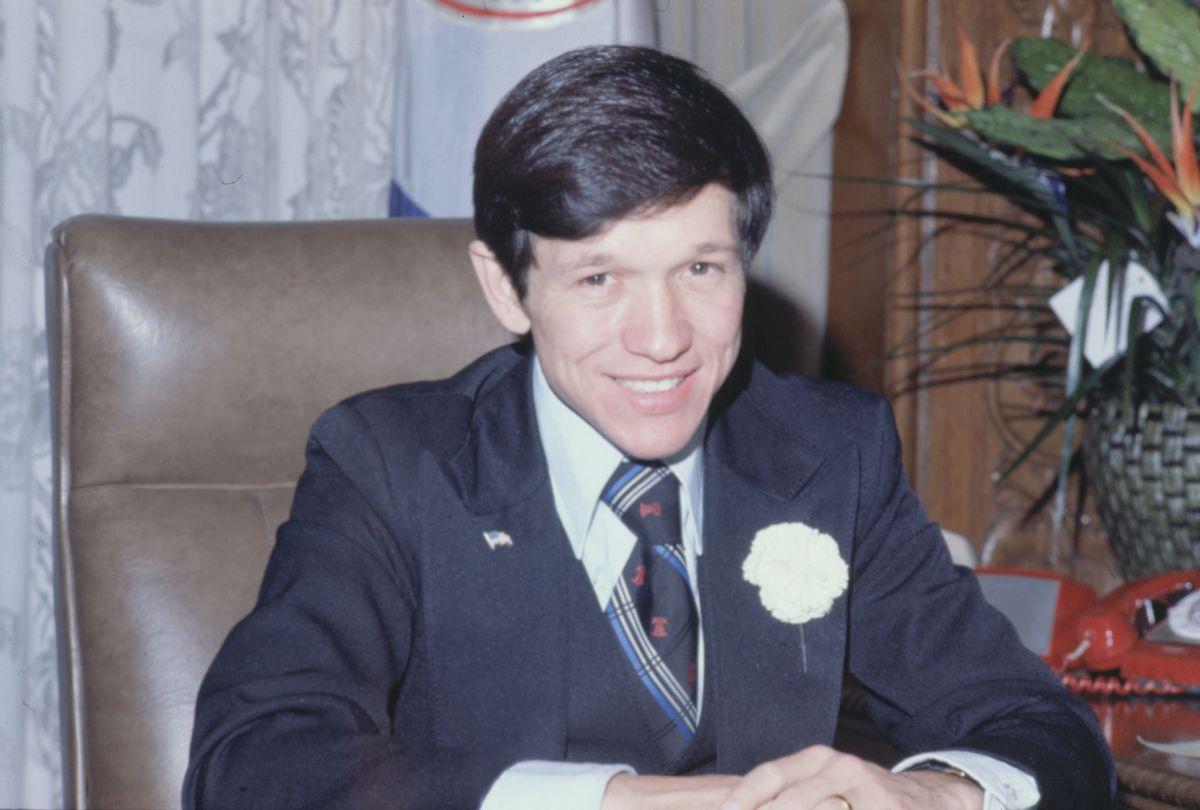
One of the schemes adopted by some of these crooks was to create artificial blackouts to undermine support for Kucinich and Muny Light, the publicly owned utility.
Cleveland Electric Illuminating Company (CEI) wanted to force the sale of Muny Light so it could obtain a monopoly on electric power in Cleveland.[6]
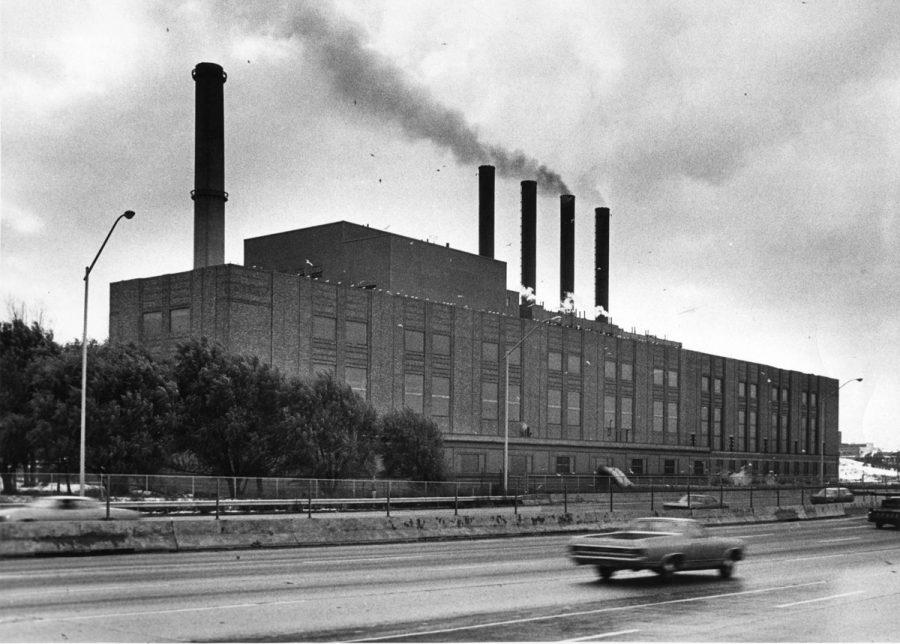
City Council President George L. Forbes, who was in the pocket of CEI, precipitated a garbage strike in order to try and further erode support for Kucinich, while CEI aligned with local banking interests tied to CEI through interlocking directorates to plunge Cleveland into a default of its debts.[7]
Smeared by his political opponents and the local media[8] and blacklisted for a period he left office, Kucinich survived a mafia assassination plot that, according to Lieutenant Edward Kovacic, then-head of Cleveland’s police intelligence unit, resulted from Kucinich’s efforts to “stop the selling [of] a light plant in Cleveland that would have made some people a lot of money.”[9]
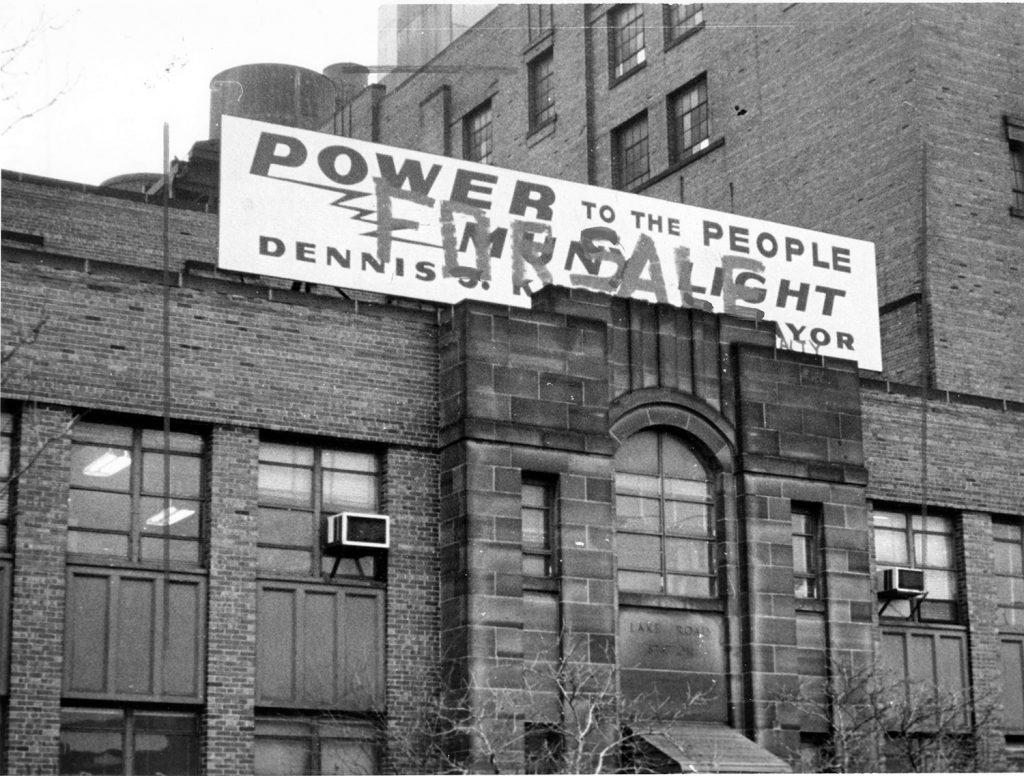
Kucinich lost his re-election campaign, though he was celebrated 20 years later by the City Council for helping Cleveland provide low-cost electricity that saved the city more than $300 million while keeping taxes low and fueling economic development.[10]
Today, Kucinich is the same man who fought City Hall and corporate power in Cleveland back in the 1970s.
In February 2023, I heard him give a speech at the Rage Against the War Machine rally in Washington, D.C., where he criticized U.S. weapons sales and the proxy war in Ukraine; raised alarm about unethical gain-of-function research that resulted in his assessment in the manufacture of the COVID-19 virus; and lamented censorship of anti-war activists and scientists who questioned the dominant narrative about COVID-19 being promoted in the mainstream.
Kucinich stated in his speech that “the reprehensible conduct of the U.S. government has “debased the U.S. Constitution and threatened the peace of the world” to the extent that “even former intelligence officials are aghast.” The people of Ukraine have been “used as pawns in a vicious geopolitical chess game,” and “the people of Taiwan will be used next as the U.S. tries to portray China as the aggressor while it surrounds it with military bases.”
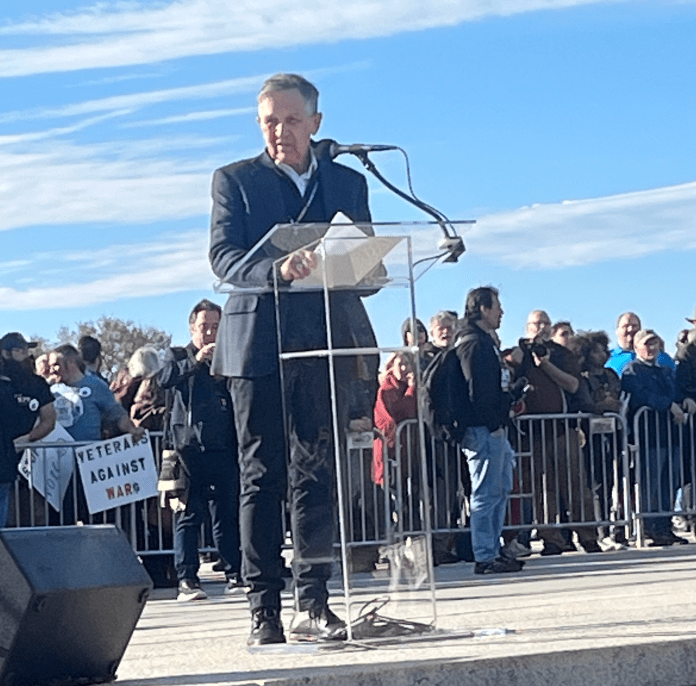
These words resonate even more a year and a half later with the looming threat of world war driven by the powerful financial interests that Kucinich has nobly fought against for the last 55 years.

Another example Kucinich gave was when the CIA broke into the computers of the Senate Intelligence Committee, then headed by Senator Dianne Feinstein, which was investigating its support of torture. ↑
Dennis J. Kucinich, The Division of Light and Power (Cleveland, OH: Avenue Books, 2021), VI, 135. ↑
Kucinich, The Division of Light and Power, 4. ↑
Kucinich, The Division of Light and Power, 71. ↑
Kucinich, The Division of Light and Power, 77. ↑
Kucinich, The Division of Light and Power, 178. CEI was trying to negotiate a deal for the sale of Muny Lights at a discount price. ↑
Kucinich, The Division of Light and Power, 335. Cleveland Trust and National City Bank, which stood to cash in on the fire sale, refused to allow the city to refinance the city’s debt unless it sold Muny Light. Two former city employees under Kucinich, Dan Marschall and James Harkins, Jr,, uncovered how Cleveland Trust held more than $27 million of CEI securities and nearly 784,000 shares of CEI stock, while managing $70 million of CEI’s $130 million pension funds. A Democrat who was African-American, Forbes precipitated the garbage workers strike by refusing to pass legislation for contractually obligated pay increases for the city’s mechanics who serviced the garbage trucks. Forbes was himself later indicted on bribery charges and engaging in organized crime, though was acquitted in what Kucinich described as a corrupt judicial process. In 1992, Forbes became president of the Cleveland NAACP. ↑
Kucinich says that he was compared to Hitler, Stalin, Pol Pot and cult leader Jim Jones who engineered the mass suicide of his followers at Jonestown. The Cleveland Plain Dealer received extensive advertising revenue from CEI. ↑
Kucinich, The Division of Light and Power, 544. A mob hitman interviewed by a local television network complained: “We can’t buy Kucinich. That’s what I was told. We can’t buy Kucinich. He was cut from a different cloth, and they didn’t know where he was coming from, what angle he was coming from, and so we had to go different ways with him. You can’t get any more serious than that.” ↑
Kucinich, The Division of Light and Power, 358. Besides surviving the financial earthquake caused by the shadow government of big business and banking interests that sought to undermine him and saving Muny Light from privatization, Kucinich cites his accomplishments as mayor as follows: “making Muny Light profitable for the first time in ten years, reducing city payrolls by 17%, paying off the inherited $15 million debt to CEI, saving millions by eliminating outside contractors, improving police response time, tripling the size of the snow removal fleet, expanding recreational faciities, securing development without tax abatements, and stopping corruption, kickbacks, payroll padding, and racketeering.” ↑
CovertAction Magazine is made possible by subscriptions, orders and donations from readers like you.
Blow the Whistle on U.S. Imperialism
Click the whistle and donate
When you donate to CovertAction Magazine, you are supporting investigative journalism. Your contributions go directly to supporting the development, production, editing, and dissemination of the Magazine.
CovertAction Magazine does not receive corporate or government sponsorship. Yet, we hold a steadfast commitment to providing compensation for writers, editorial and technical support. Your support helps facilitate this compensation as well as increase the caliber of this work.
Please make a donation by clicking on the donate logo above and enter the amount and your credit or debit card information.
CovertAction Institute, Inc. (CAI) is a 501(c)(3) non-profit organization and your gift is tax-deductible for federal income purposes. CAI’s tax-exempt ID number is 87-2461683.
We sincerely thank you for your support.
Disclaimer: The contents of this article are the sole responsibility of the author(s). CovertAction Institute, Inc. (CAI), including its Board of Directors (BD), Editorial Board (EB), Advisory Board (AB), staff, volunteers and its projects (including CovertAction Magazine) are not responsible for any inaccurate or incorrect statement in this article. This article also does not necessarily represent the views the BD, the EB, the AB, staff, volunteers, or any members of its projects.
Differing viewpoints: CAM publishes articles with differing viewpoints in an effort to nurture vibrant debate and thoughtful critical analysis. Feel free to comment on the articles in the comment section and/or send your letters to the Editors, which we will publish in the Letters column.
Copyrighted Material: This web site may contain copyrighted material the use of which has not always been specifically authorized by the copyright owner. As a not-for-profit charitable organization incorporated in the State of New York, we are making such material available in an effort to advance the understanding of humanity’s problems and hopefully to help find solutions for those problems. We believe this constitutes a ‘fair use’ of any such copyrighted material as provided for in section 107 of the US Copyright Law. You can read more about ‘fair use’ and US Copyright Law at the Legal Information Institute of Cornell Law School.
Republishing: CovertAction Magazine (CAM) grants permission to cross-post CAM articles on not-for-profit community internet sites as long as the source is acknowledged together with a hyperlink to the original CovertAction Magazine article. Also, kindly let us know at info@CovertActionMagazine.com. For publication of CAM articles in print or other forms including commercial internet sites, contact: info@CovertActionMagazine.com.
By using this site, you agree to these terms above.
About the Author

Jeremy Kuzmarov holds a Ph.D. in American history from Brandeis University and has taught at numerous colleges across the United States. He is regularly sought out as an expert on U.S. history and politics for radio and TV programs and co-hosts a radio show on New York Public Radio and on Progressive Radio News Network called “Uncontrolled Opposition.”
He is Managing Editor of CovertAction Magazine and is the author of six books on U.S. foreign policy, including Obama’s Unending Wars (Clarity Press, 2019), The Russians Are Coming, Again, with John Marciano (Monthly Review Press, 2018), Warmonger. How Clinton’s Malign Foreign Policy Launched the U.S. Trajectory From Bush II to Biden (Clarity Press, 2023); and with Dan Kovalik, Syria: Anatomy of Regime Change (Baraka Books, 2025).
Besides these books, Kuzmarov has published hundreds of articles and contributed to numerous edited volumes, including one in the prestigious Oxford History of Counterinsurgency .
He can be reached at jkuzmarov2@gmail.com and found on substack here.




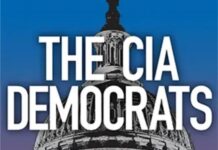
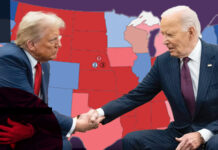





@Conrad: you seem to confuse “rabid Zionists” with “far right White Supremacists”
This is not an opinion but just an observation. Kucinich is a strong supporter of Robert Kennedy Jr.. Robert Kennedy Jr. is a strong supporter of of Donald Trump I personally strongly oppose Robert Kennedy Jr. , and Donald Trump, so I am hesitant to describe Kucinich as a “stalwart progressive” based on my aforementioned observation.
He was a supporter of RFK Jr but that is not necessarily the case now.
The people of Ukraine have been “used as pawns in a vicious geopolitical chess game,” and “the people of Taiwan will be used next as the U.S. tries to portray China as the aggressor while it surrounds it with military bases.”
Yes, that is right. Britain and the US supply depleted uranium weapons to the Ukraine which will poison the people who live there. This is an extremely curious way of showing support.
Except for a few exceptions Trump is choosing mostly far right White Supremacists to high level positions. Even worse than his 2016 appointments.